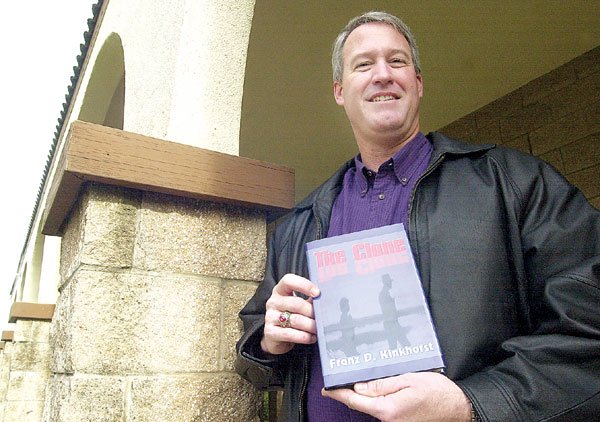SAN MARTIN
– Franz Kinkhorst tried to write a story describing scientific
and social issues about the future. However, by the time his book
got published, much of the fiction has become fact.
SAN MARTIN – Franz Kinkhorst tried to write a story describing scientific and social issues about the future. However, by the time his book got published, much of the fiction has become fact.
So much so that in his first book, “The Clone,” Kinkhorst writes almost an apologetic summary stating the advancements in cloning technology even from the time that he first came up with the idea for his book through the year he spent writing it.
Still, Kinkhorst deals with many social issues with the rapid advances in technology by asking questions and posing situations that others might not ponder when it comes to technology.
“You’ll find that science takes on a life of its own sometimes,” Kinkhorst said. “The Wright Brothers didn’t take off with machine guns (attached to their plane), but years later planes are used for warfare. Science takes a big step here and a perverted one there. Scientists are on a whole other wavelength. There’s a lot of social issues, and sometimes they don’t have a lot of social skills.”
The San Martin author’s first book is really two books in one with a second story, “Young Again,” included. The stories raise issues with some of these “perverted” scientific steps.
In “The Clone,” scientists’ bodies and memories are cloned in order to create a perfect human race in almost a cult-like fashion, and in “Young Again” an elderly woman accidentally takes a youth formula from a scientist that puts her body back into its 20s. The woman deals with being a 70-year old in a 26-year-old’s body, including falling in love with a younger man.
While the stories may seem a bit exaggerated, Kinkhorst said the idea is to get a better understanding of the technology we are dealing with – both an exciting and scary time in science.
“What I’m writing might not be that far off,” he said. “That’s what makes it really fun.”
While Kinkhorst’s lead character in “The Clone” refuses to take part in cloning experiments going on in a secret laboratory in the Silicon Valley, Kinkhorst’s views on cloning is a more curious approach. Kinkhorst said he is intrigued by the idea posed in the book about being able to clone someone’s memories and life experiences.
“It’s impossible to actually clone someone,” he said. “It would never actually be you. You would have the same make-up, but the experiences and memories would be different, so by the time the clone reached your age, it would be entirely different because of its different experiences.”
He said “Young Again,” which he wrote in a single day after a profound dream about the story, also poses many philosophical questions, including how one would affect not only their own life if they discovered a fountain of youth, but other people’s lives as well.
“There’s a lot of sociological issues that go along with it,” he said. “Life is incredibly complicated. You don’t know whose life you will touch and how it will affect them.’
Kinkhorst began writing creatively when he was in high school.
“In high school, you always had to write an essay on something,” he remembered. “I hated doing that, so I asked to write creative stories.”
The San Martin resident of two years said he draws from his life experiences that have taken him from the Navy to graphic arts to photography and now as a security officer at the Nasa site in Redwood City.
“All the places I’ve gone and things I’ve done, all of a sudden you sit down and start writing and there’s so much to draw upon,” he said. “You have to go out and live life and get those experiences.”
However, the job at NASA, where Kinkhorst has worked for nearly 10 years, has been a real inspiration for his creativity.
“We work with the secret service, FBI, White House staff,” he said. “You get to see a lot of high-tech things going on.”
However, while Kinkhorst does see some interesting things going on and hears about strange projects at NASA, the inspiration is his own fantasy.
“When I’m writing these books, I really don’t know where it’s coming from,” he said. “It’s like a movie in my head. I just watch the characters and write what they do.”
Kinkhorst has no plans to quit writing science-fiction stories, and he is already is working on another book, called “Project Resurrection,” where a computer becomes to high-tech that it actually becomes aware of itself.
And as far as his stories go depends on the futures he can envision in his mind.
“Imagination is more important than knowledge,” he said.













